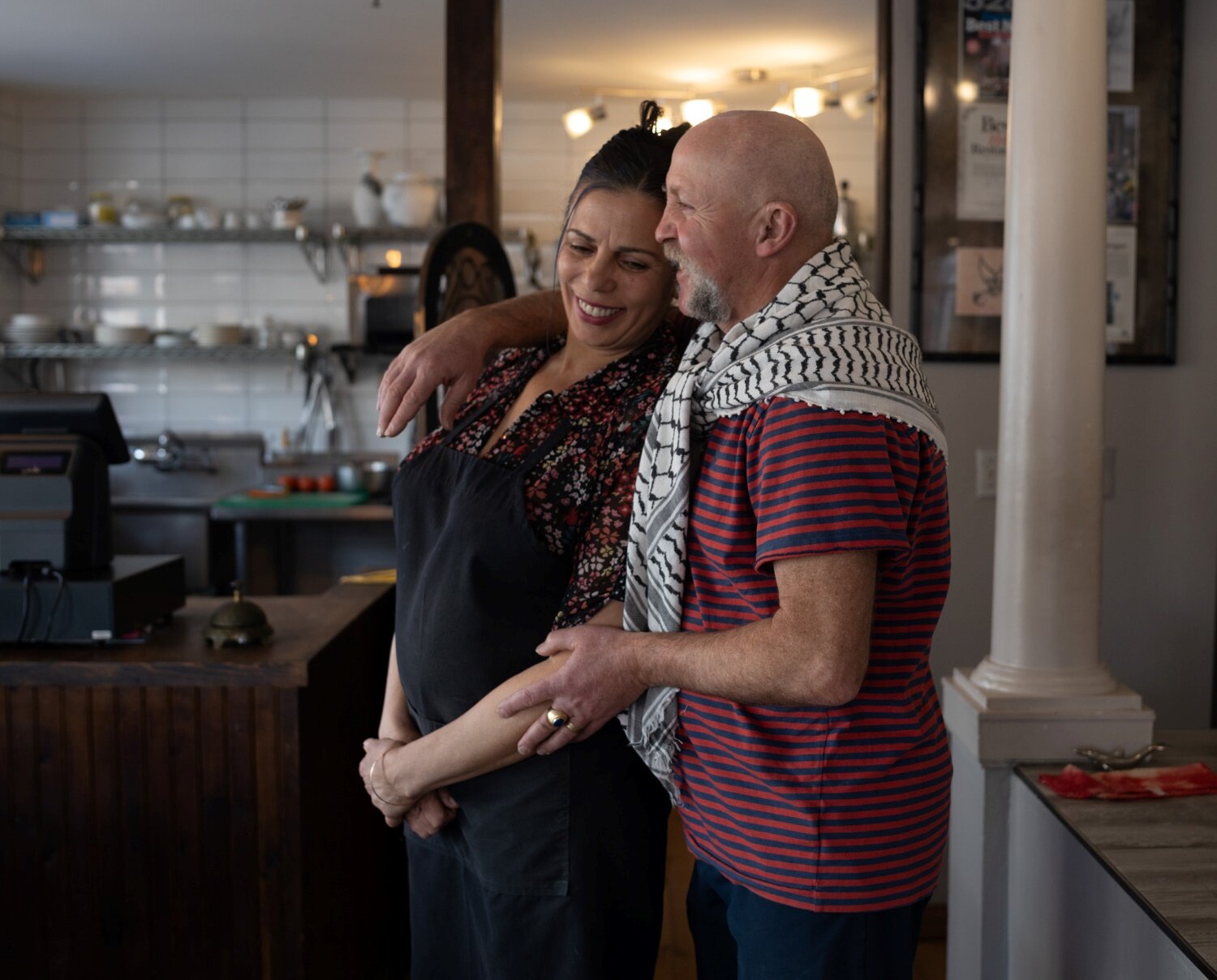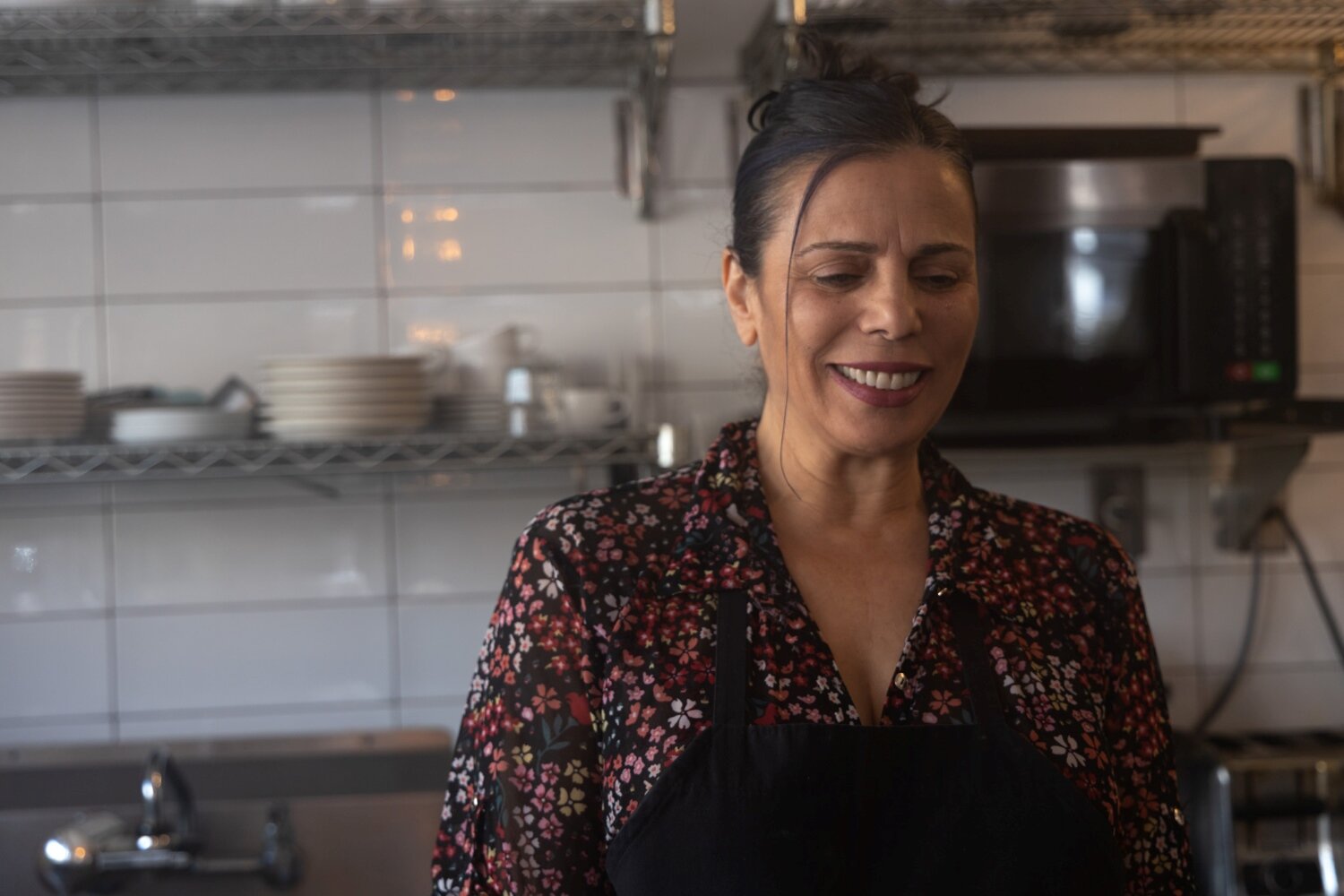A Boulder bistro brings unity and reprieve

BOULDER, Colo. — In the heart of Boulder, just two blocks from Pearl Street, is an unassuming, almost hidden-in-plain-sight bistro serving mouth-watering dishes from the Middle East.
While Mediterranean restaurants are ubiquitous in cities across the U.S., Arabesque feels different — and not just because of the impeccable food. That’s because of its two larger-than-life personalities: owner Manal Jarrar and her husband, Sa’eb, both Palestinians born and raised in Acre, Israel.
The two routinely bicker and run the restaurant almost like Lucy and Desi, with no additional help other than an occasional part-time employee.
Between the hustle and bustle of preparing dishes and taking orders, the two stop at each table and relish in moments of connection with customers. It’s a rare, intimate dining experience, one they take time to savor as much as their clientele does their food.
“Palestinians, Israelis, we’re very friendly, we’re too friendly,” Jarrar joked. “We are like octopuses.”

Owner Manal Jarrar and her husband, Sa’eb, are both Palestinians born and raised in Acre, Israel.
Photo: Andrea Kramar, Rocky Mountain PBS
Jarrar and Sa’eb embody a peace they hope can exist in the middle east between Jews, Israelis and Palestinians. One of their favorite customers is Sabrina, a young Ashkenazi Jew who stopped in for lunch with a friend.
The Jarrars chatted and caught up with the two guests as if they were in the confines of their own home. When Sabrina walked out the restaurant door, she and Manal shared air kisses.
“I'm not just a woman or a Palestinian. You get to the point in life where you are part of the world,” Jarrar said. Jews and Arabs, “we breath the same air,” she said.
Jarrar, who is in her mid-50s, opened the restaurant in 2009. It was a new path for her after a decades-long career as a ballet dancer and teacher.
She realized she had a “cooking-mind,” as she calls it, after kids at her children’s school started asking for her food. School lunches turned into a catering gig and soon Jarrar, who says she’s not a natural-born cook, realized she had a second talent.
The café’s name, Arabesque (the French word for a ballet pose) is an homage to Jarrar’s dancing career. After years of struggling as a Palestinian within Israeli ballet studios, Jarrar earned a full-ride scholarship to attend an elite school in Haifa. She eventually became a ballet teacher in Jewish and Arab towns in Israel before immigrating to the U.S. in 1988.
Jarrar has shown the same tenacity running her restaurant.
“I don't want people to treat me differently because I’m Palestinian, or say, ‘I feel bad…’ No! Treat me as a successful businesswoman,” she said.
The food at Arabesque is, simply put, faultless. One daily special — dajaj — is a plate of tender Arabic chicken with roasted potatoes marinated in olive oil and various spices (the details of which were not shared with Rocky Mountain PBS). The homemade pita bread was just as delightful — fluffy and warm, with a side of creamy hummus that Sa’eb insisted you first try with your finger.
Jarrar cooks and prepares her food in the basement of the café after it closes each day at 3 p.m.
Eggs come from the chickens she and Sa’eb raise at their home in Longmont. The grape leaves are home-grown, too.

At first, Jarrar might come off as intimidating and a little bit too direct. Many of her Yelp reviews indicate as much. She’ll even tell you so herself. But if you can get past that, she’s full of charm, wit and humor.
The day Rocky Mountain PBS visited, a culinary group stopped by during a Boulder food tour. The tour’s leader, Megan Bucholz of Local Table Tours, regularly takes her guests to Arabesque.
Everyone at the table seemed delighted by the chai, sampler of hummus, baba ghanouj and grape leaves, the chicken dajaj and the baklava.
As she was serving her dishes to them, Jarrar half-joked, “Eat it, and if you don’t like anything, be quiet.”
Later in their meal, she was overheard saying, “If you don’t eat chicken, you’re going to start eating it today.”
Despite Jarrar’s sarcastic humor, she can be solemn, and said she was aware of the privilege of cooking food in America, while thousands of miles away, Palestinians are starving in Gaza.
[Related: Palestinians in Gaza begin Ramadan with hundreds of thousands on the brink of famine]
“My heart hurts,” she said of the Israel-Hamas war, which has been raging for five months now and shows few signs of letting up. “It’s a shame for humanity to get to this point.”
Jarrar talks to her Palestinian mother in Israel regularly over the phone, who often asks why America can’t do anything to stop the war.
As Palestinians born and raised in Israel, Jarrar and Sa’eb walk a tight rope, and seem to have a unique understanding of the complicated history between Israelis and Palestinians.
“People never look at each other and think: What are we doing?” said Jarrar. “Why are we coming and taking your home and your land and starving you and killing your babies and children? They never question: Why are we killing that Israeli soldier who has feelings, a mom and a dad?”
Jarrar likens the current conflict to the Crusades, a series of religious wars that lasted centuries and resulted in the deaths of hundreds of thousands of people.
She sees her café as a place that bridges the division between people by, quite literally, breaking bread.
“Sometimes it's good to look deeper in people,” Jarrar said. “There’s a goodness there.”
As she glided from table to table — with the grace of the dancer she once was — she said, “When I spot it, I’m happy.”
Andrea Kramar is the investigative multimedia journalist at Rocky Mountain PBS. Andreakramar@rmpbs.org